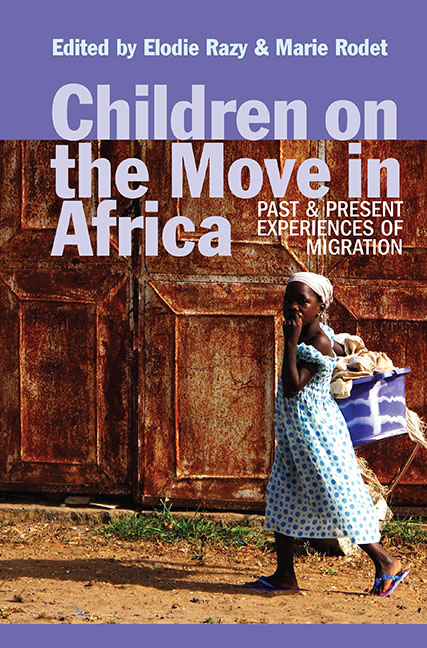Book contents
- Frontmatter
- Contents
- List of Illustrations
- Notes on Contributors
- Preface
- Acknowledgements
- Introduction: Child Migration in Africa: Key Issues & New Perspectives
- Part I CHILD MIGRANTS IN AFRICA: BEYOND THE DILEMMA OF VULNERABILITY v. AGENCY
- Part II BEING A CHILD & BECOMING A GENDERED ADULT: THE CHALLENGES OF MIGRATIONS IN CHILDHOOD
- Part III MOBILITY, IMAGINATION & MAKING NATIONS
- Bibliography
- Index
Introduction: Child Migration in Africa: Key Issues & New Perspectives
Published online by Cambridge University Press: 25 October 2017
- Frontmatter
- Contents
- List of Illustrations
- Notes on Contributors
- Preface
- Acknowledgements
- Introduction: Child Migration in Africa: Key Issues & New Perspectives
- Part I CHILD MIGRANTS IN AFRICA: BEYOND THE DILEMMA OF VULNERABILITY v. AGENCY
- Part II BEING A CHILD & BECOMING A GENDERED ADULT: THE CHALLENGES OF MIGRATIONS IN CHILDHOOD
- Part III MOBILITY, IMAGINATION & MAKING NATIONS
- Bibliography
- Index
Summary
In academic circles, national and international public policy and the media, three dominant contrasting visions of childhood dominate. In discourses produced by and about the global North, the dominant images are the spoiled child and the rebellious child. However, the North's perception of the South – and particularly of Africa – is mostly characterized nowadays by variations on the theme of the child as victim. Childhood – a biological, age and social category, as well as a period of the life cycle which is historically, socially and culturally constructed – provokes ambivalence and concern: for example, do we speak of ‘disciplining’ children or of ‘saving’ them? These depictions combine to draw an artificial boundary between Europe and Africa.
This boundary can be critically examined using the figure of the child migrant, revisiting its historical roots in order to better understand the contemporary challenges it poses. This may also help to document social changes in Africa and the complex relations between Africa and Europe, both past and present. Yet while adult migrations have received significant scholarly attention over a period of many years, child migration – whether intra- or extra-African – has long remained in the shadows.
The analysis of children's migratory experiences is at the crossroads between numerous academic disciplines and institutional or professional spheres, between which there is usually little dialogue. How can we define child migration across disciplines? Due to the liminality of childhood and the often-ambivalent position of children, a focus on children complexifies our approach to migration. It is crucial to delve deeply into children's lives to understand their migratory worlds. However, the literature rarely distinguishes between mobility, migration and circulation. Here, we use the term ‘migration’, as it seems to us that the generally-accepted meaning of this term is broader than that of ‘mobility’. The latter effectively excludes the possibility of periods of immobility or pause within the migratory pathway, and is often associated primarily with the concept of social mobility. It also leads to a scientific questioning of the success or failure of the migration, and whether it is emancipating or alienating – which are highly subjective and often essentializing factors. Likewise, the term ‘circulation’, referring to a particular form of migration constituted of successive displacements and ‘return trips’, cannot be used as a generic term as it excludes one-off, permanent migration.
- Type
- Chapter
- Information
- Children on the Move in AfricaPast and Present Experiences of Migration, pp. 1 - 29Publisher: Boydell & BrewerPrint publication year: 2016

